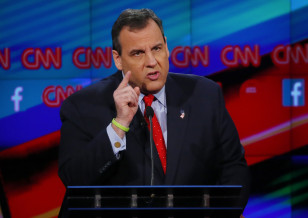By Barbara Slavin
Republican presidential candidates at their debate last night in Las Vegas focused on terrorism as a major threat to the American way of life.
New Jersey Gov. Chris Christie was the most dramatic, accusing President Barack Obama and former Secretary of State Hillary Clinton of “betraying” Americans through “weak” and “feckless” leadership.

Republican presidential candidate New Jersey Governor Chris Christie speaks during the Republican presidential debate in Las Vegas on Dec. 15, 2015. (Reuters)
“People across this country are scared to death,” Christie said, looking directly into the camera at a television and Internet audience of millions. “Because I could tell you this, as a former federal prosecutor, if a center for the developmentally disabled in San Bernardino, California is now a target for terrorists, that means everywhere in America is a target for these terrorists.”
Christie’s chilling reference to the December 2 attack that killed 14 people at a holiday party may be his best hope to gain support in a crowded field – or to become attorney general if the next president is a Republican. But statistics show that the threat from the group that calls itself the Islamic State (ISIS) is not on a par with other major concerns, including gun violence, which the Centers for Disease Control and Prevention says takes 10,000 lives in the U.S. every year.
Since September 11th, attacks by right-wing extremists have killed 48 people in the United States compared to 43 dead by the hands of radical Islamists, according to the New America Foundation’s International Security Program.
Furthermore, another study released earlier this month by George Washington University Program on Extremism, 71 people have been arrested in America for links to ISIS since the group declared its “caliphate” in 2014. Of that number, a big majority — 58 –were American citizens. Nearly half were not born Muslim, and a third were under age 21.
The remedy advocated by Christie and several other Republican candidates – restricting or, in the case of Donald Trump, banning Muslims from immigrating to the United States – is not the best way to diminish the danger.
Combating the threat of domestic terrorism requires a much more nuanced approach targeted less on immigrants and refugees than on troubled American youth. Experts in the field of what is known as countering violent extremism point to pilot programs in the American cities – Boston, Denver and Minneapolis – that have shown promise in identifying susceptible young people before they “self-radicalize,” typically via the Internet.
Another study tells of a case in Denver, Colorado, where the FBI spotted a would-be jihadist named Shannon Conley. By working with her parents and religious leaders, authorities were able to persuade her not to travel to Syria, but to work in her community to assist refugees from the Syrian civil war.
In Minneapolis, meanwhile, Abdullahi Mohamud Yusuf, an ethnic Somali who was planning to join ISIS, was placed in a half way house and obliged to work with a group that promotes civic involvement, the study said.
Techniques that have succeeded in addressing gang violence and drugs may be more applicable to such young people than other counter-terrorism and law enforcement methods.
Diminishing the appeal of ISIS in America. also depends on puncturing the group’s narrative of success abroad. Here the Obama administration can be justifiably criticized for lacking a decisive military strategy, but it’s far from clear that Republican prescriptions would work any better.
For example, Texas Sen. Ted Cruz’s recommendation to “carpet bomb” the ISIS “capital” in Syria, Raqqa, would kill thousands of innocent civilians, including many who do not subscribe to radical Islam.
The campaign against ISIS also requires the broadest possible international coalition. In that context, Ohio Gov. John Kasich’s threat to punch the Russians “in the nose” is likely to be counterproductive. Christie’s promise to shoot down a Russian fighter plane if it intruded into the airspace of a yet-to-be established no fly zone in Syria on the border with Turkey was no better.
The nine Republicans on the stage in Las Vegas were also almost universal in their derision for the nuclear agreement reached earlier this year with Iran, another country that has been battling ISIS even as it supports the Syrian regime of Bashar al-Assad, which has been a major catalyst for the growth of the group.
Cruz, who like Kentucky Sen. Rand Paul is semi-isolationist when it comes to sending U.S. ground troops abroad, made an exception for the Islamic Republic which, Cruz said, had “declared war” on the United States.
Trump, while decrying the incredible waste of American taxpayer money on overturning the government of Iraq, called the nuclear deal with Iran “horrible, disgusting and incompetent.” Yet the flamboyant New York real estate magnate is so ignorant about nuclear matters that he did not understand a question referring to the “triad” — the means of delivering a nuclear weapon from air, land or sea.
“Nuclear, the power, the devastation, it’s very important to me,” was the incoherent response of a man who fancies himself the future commander in chief of the world’s greatest superpower.
Trump also seemed to think there is a way of barring jihadists from what he called “our” Internet.
In this comedy of errors, former Florida Gov. Jeb Bush, who has struggled to gain popular support, distinguished himself as a relative grownup.
He pushed back in particular against Trump’s proposal to ban Muslim immigrants.
“We can’t dissociate ourselves from peace-loving Muslims,” Bush said. As for defeating ISIS abroad, he said, “It’s about developing a strategy, leading the world.”

